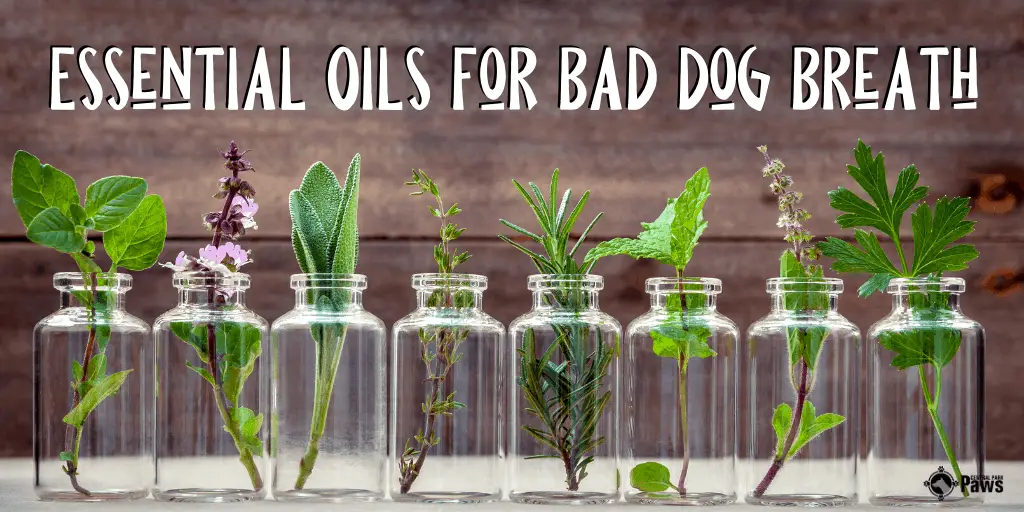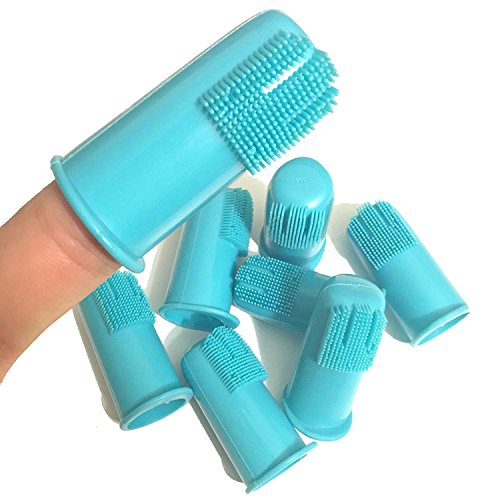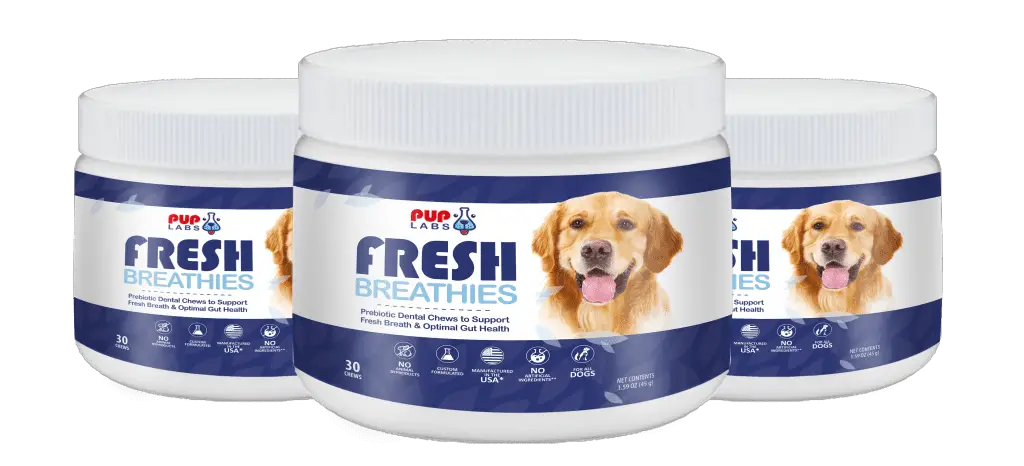It doesn’t happen very often, but when I first noticed it during her puppy days, the scent hit my nose like a freight train.
A friend told me to buy breath freshening dental treats, so I did.
They ended up costing more than what I had room for in my budget and there weren’t many treats in the bag. I began giving them to Maggie once a week to stretch out the purchase, instead of letting her have one every day like the directions said.
They didn’t make much of a difference with just one treat a week, which is what led me to find other alternatives.
It turns out that essential oils can be used to not only cure bad dog breath but freshen it as well.
Check out what I’ve learned about essential oils and which ones can help your dog’s bad breath disappear.
The Best Essential Oils for Dog Breath
Some essential oils are better at stopping the root causes of your dog’s bad breath while others are better at making your dog’s breath smell better.
| Oil | Latin Name | Purpose | Method | Price |
|---|---|---|---|---|
| Cardamom | Elettaria cardomomum | Freshens bad breath | Dilute and rub on gums or chin | $$$$ Check Price |
| Coconut | Cocos nucifera | Freshens bad breath | Use as toothpaste | $ Check Price |
| Ginger | Zingiber officinale | Cures bad breath | Let dog drink in water | $$$$ Check Price |
| Helichrysum | Helichrysum gymnocephalum | Curse bad breath | Dilute and rub on gums or skin | $$ Check Price |
| Spearmint | Mentha spicata | Freshens bad breath | Dilute and rub on gums or chin | $$$ Check Price |
| Tea Tree | Melaleuca alternifolia | Cures bad breath | Dilute and rub on gums and teeth | $$$ Check Price |
The Best Essential Oils to Cure Bad Dog Breath
There’s nothing worse than snuggling up with your dog only to get a nose full of sour breath.
These are the essential oils I’d give Maggie to make the bad breath go away.
Helichrysum Oil
The first thing you want to do to cure bad breath is to help your dog’s digestive system, which has probably been disrupted.
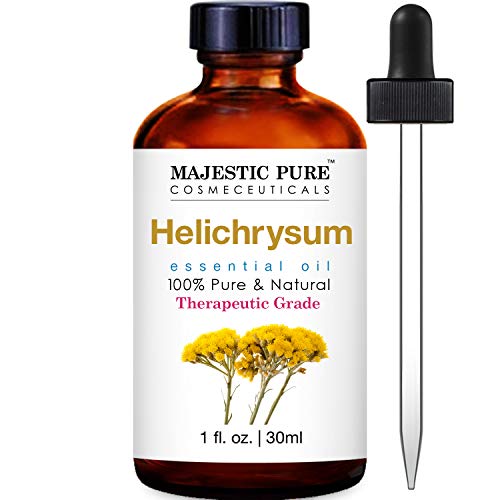
Helichrysum oil does just that.
What it Does
Helichrysum oil is very healing because of its anti-inflammatory, antifungal and antibacterial[1], so it’s used for a variety of canine ailments.
When taken for bad breath, it calms the digestive system and revitalizes the liver, so your dog’s digestive process gets back on track.
Helichrysum essential oil can also be used to soothe your dog’s hotspots.
How it Does it
The anti-inflammatory properties in this oil quickly calm any irritated pathways in the gut.
How to Use this Oil
You can rub this oil into the skin for gut health or dilute two drops in a carrier oil such as fractionated coconut oil and rub the liquid over your dog’s teeth and tongue.
Possible Side Effects
Helichrysum oil is also used to reduce bleeding because it constricts blood vessels when applied to open wounds, so using it topically may raise blood pressure.
Potential Concerns
Dogs on blood pressure medication should consult a vet before using helichrysum oil just to be safe.
Product Recommendation
Ginger Essential Oil
Another way to treat upset digestive tracts is to give your dog a small amount of ginger essential oil.
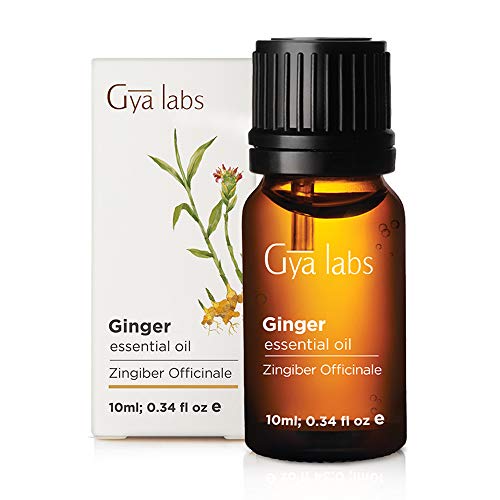
As acid reflux reduces, foul breath will be a thing of the past.
What it Does
It soothes upset tummies and acid reflux in dogs like it does in humans, which is much harder to do naturally with dogs because of a limited medicinal field.
Ginger can also be used to relieve your dog’s pain.
How it Does it
Ginger has anti-inflammatory and healing properties that work in humans and dogs[2].
How to Use this Oil
Dilute two drops of ginger oil in a quarter cup of water and let your dog lap it up.
Possible Side Effects
Ginger is all-natural and easy to digest, so there won’t be any side effects unless your dog drinks an entire bottle undiluted.
If that happens, they may have an upset stomach and diarrhea.
Potential Concerns
Make sure when you buy ginger essential oil that the only component is actual ginger.
The scent or flavor of ginger means that the oil is made from a non-organic manufacturer, which could include ingredients that may hurt your dog.
Also, ginger can thin the blood and lower blood sugar levels, so don’t give your dog ginger before surgery or if they have diabetes.
Related: Which Essential Oils are Dangerous to Dogs?
Product Recommendation
Tea Tree Oil
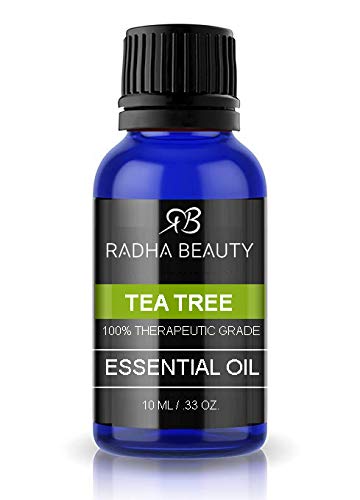
Tea tree oil can be found in many natural healthcare products for both dogs and humans, from toothpaste to ear cleansers.
What it Does
Tea tree oil fights bad doggy breath caused by plaque or gingivitis.
How it Does it
This essential oil has antimicrobial properties against various bad-breath-causing germs.
In fact, it’s more effective than some artificial oral disinfectants[3]!
How to Use this Oil
Dilute a drop or two of pure tea tree oil in a carrier oil and rub over your dog’s teeth and gums. It will slowly work to neutralize bad breath.
Possible Side Effects
If your dog reacts poorly to tea tree oil it’ll likely come in the form of lethargy, weakness, and excessive drooling.
Potential Concerns
Some dogs are sensitive to tea tree oil, so use a small amount at first and keep an eye on your dog for any adverse reactions.
Product Recommendation
The Best Essential Oils to Freshen Your Dog’s Breath
Once the cause(s) of your dog’s bad breath has gone away or at least been reduced, you’ll want to give them some of these essential oils to help freshen their breath.
Spearmint Oil
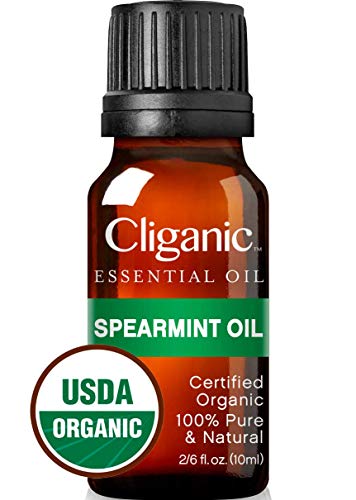
There’s nothing like refreshing your breath with a mint, which is exactly what your dog can do with spearmint oil.
What it Does
Spearmint calms any nausea or upset stomach symptoms your dog may have while it freshens their breath.
How it Does it
Mint is a natural herb that uses anti-inflammatory properties to calm any digestive system.
How to Use this Oil
Dilute a drop of spearmint essential oil in a carrier oil and rub over your dog’s teeth for instant fresh breath.
You can also rub it under their chin if they don’t enjoy the taste.
Possible Side Effects
If exposed to undiluted spearmint oil, your dog could experience mint poisoning and symptoms like diarrhea, vomiting and exhaustion[4].
Potential Concerns
Although spearmint is all-natural and super safe for humans to use, it’s extremely potent for dogs.
Always dilute spearmint oil before putting it on your dog’s teeth or coat, and never diffuse it. Diffusing the oil may cause more severe side effects.
Product Recommendation
Coconut Oil
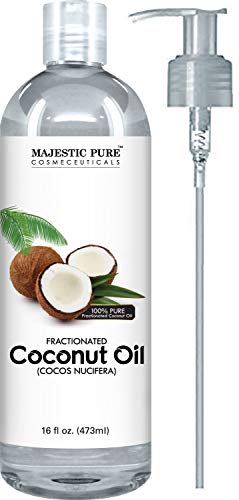
It could be argued that coconut oil is a magical treatment for many ailments, especially since it helps freshen your dog’s bad breath.
What it Does
Coconut oil gently but quickly takes care of foul dog breath while also making your dog’s gums healthier for long-term good breath.
This oil also has a wide variety of uses for your dog. You can even use it to help fight doggy dandruff!
How it Does it
The natural ingredients in coconut oil and the Medium Chain Triglycerides (MCTs) act as an anti-fungal treatment[5].
It banishes the plaque that cause bad breath and leaves behind a pleasant coconut scent.
How to Use this Oil
Coconut oil can be used by itself as a doggy toothpaste[6].
Put a tiny amount on a dog toothbrush and brush your dog’s teeth and gums.
Coconut oil can also be used as a carrier oil for other bad-breath-banishing essential oils.
Possible Side Effects
If your dog consumes too much coconut oil, your dog may have an upset stomach or diarrhea.
The MCTs in the oil can irritate sensitive stomachs, so it’s always best to use a small amount.
Potential Concerns
Dogs with pancreatitis will be more sensitive to coconut oil, as well as dogs who struggle to put on weight.
Coconut oil is often used for weight loss purposes, which should be kept in mind before giving it to your dog.
Product Recommendation
Cardamom Oil
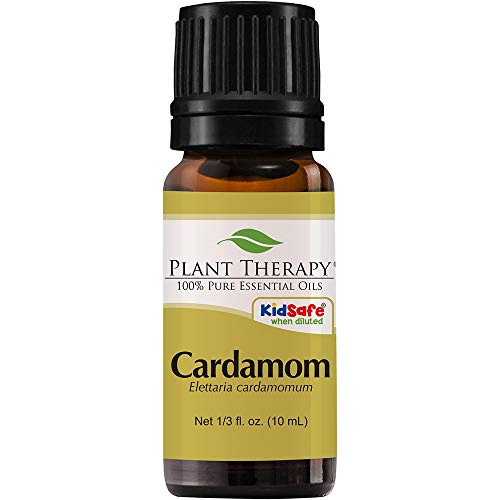
Another essential oil that smells great and is safe for dogs is the all-natural cardamom oil.
What it Does
Cardamom oil freshens your dog’s breath and improves their appetite if your dog is less inclined to eat as they once were.
How it Does it
The anti-bacterial properties in cardamom oil are what transform your dog’s breath.
They eliminate bacteria that build up around and between your dog’s teeth.
Cardamom also protects against gastrointestinal ailments, such as ulcers[7].
It also smells nice!
How to Use this Oil
Mix a few drops of this oil in a carrier oil and rub it around your dog’s teeth and tongue.
You can also rub the diluted oil along their neck and jawline for more of a fresh scent.
Possible Side Effects
Too much undiluted cardamom oil will irritate your dog’s stomach, but only if consumed in high amounts.
It may also cause your dog to pee more frequently[X], as it’s a diuretic.
Potential Concerns
The diuretic effects of cardamom oil could cause a drop in blood pressure because of the salt and water that your dog will release through their urine.
Dogs with low blood pressure should be checked out by their vet before they come in contact with cardamom oil.
Product Recommendation
Conclusion
Sometimes dogs get sour or stinky breath, but it doesn’t have to stay that way.
Try out these essential oils the next time you smell something foul on their breath to see if they’ll freshen things up for both you and your dogs.
Resources
- https://www.healthline.com/health/helichrysum-essential-oil
- https://vcahospitals.com/know-your-pet/ginger
- https://www.ncbi.nlm.nih.gov/pubmed/12553397
- https://homeguides.sfgate.com/mint-leaves-bad-dogs-71903.html
- https://www.akc.org/expert-advice/health/is-coconut-oil-good-for-dogs/
- https://petcentral.chewy.com/nutrition-food-treats-5-benefits-of-coconut-oil-for-dogs/
- https://www.sciencedirect.com/science/article/pii/S0378874105004782

